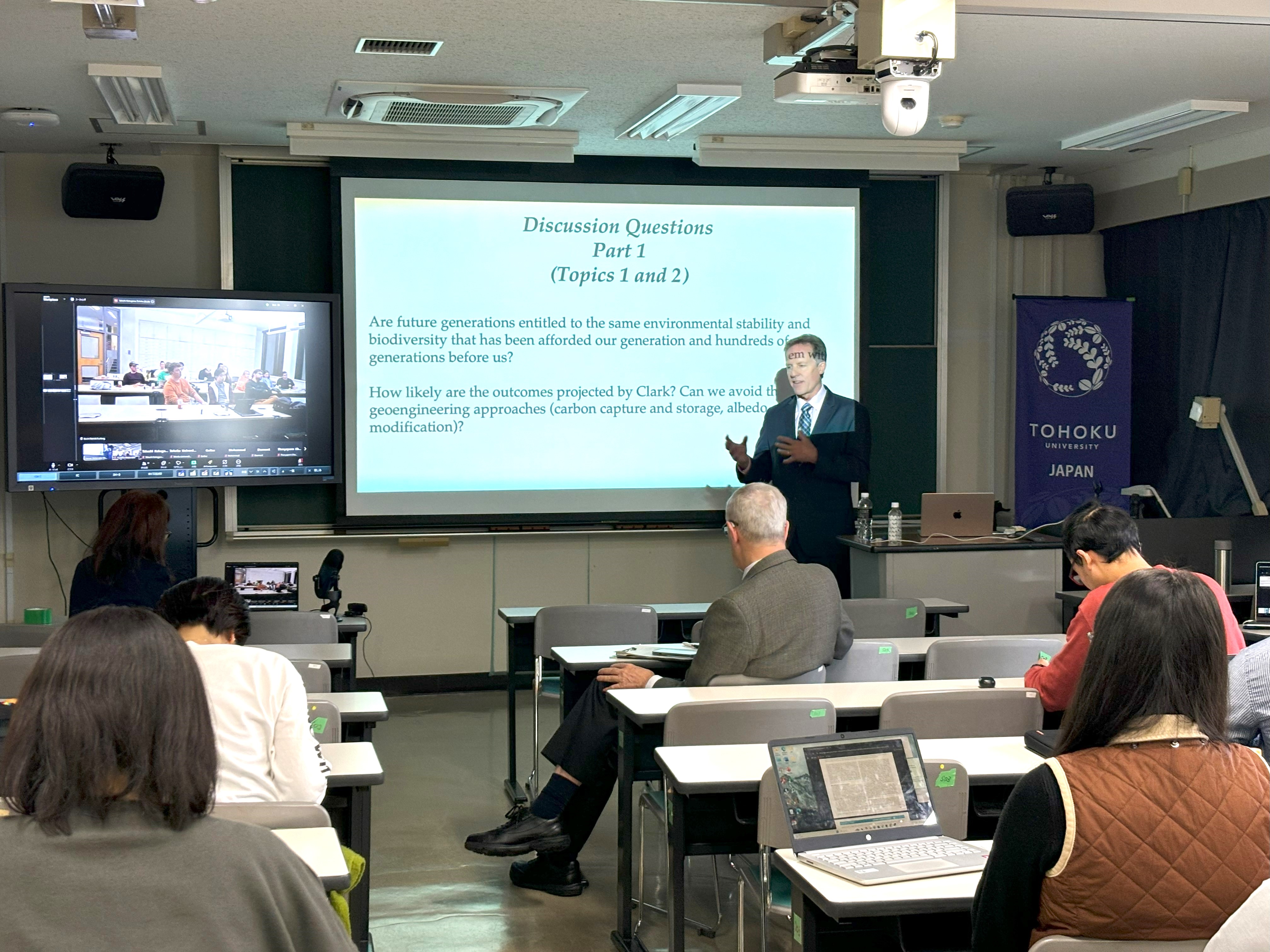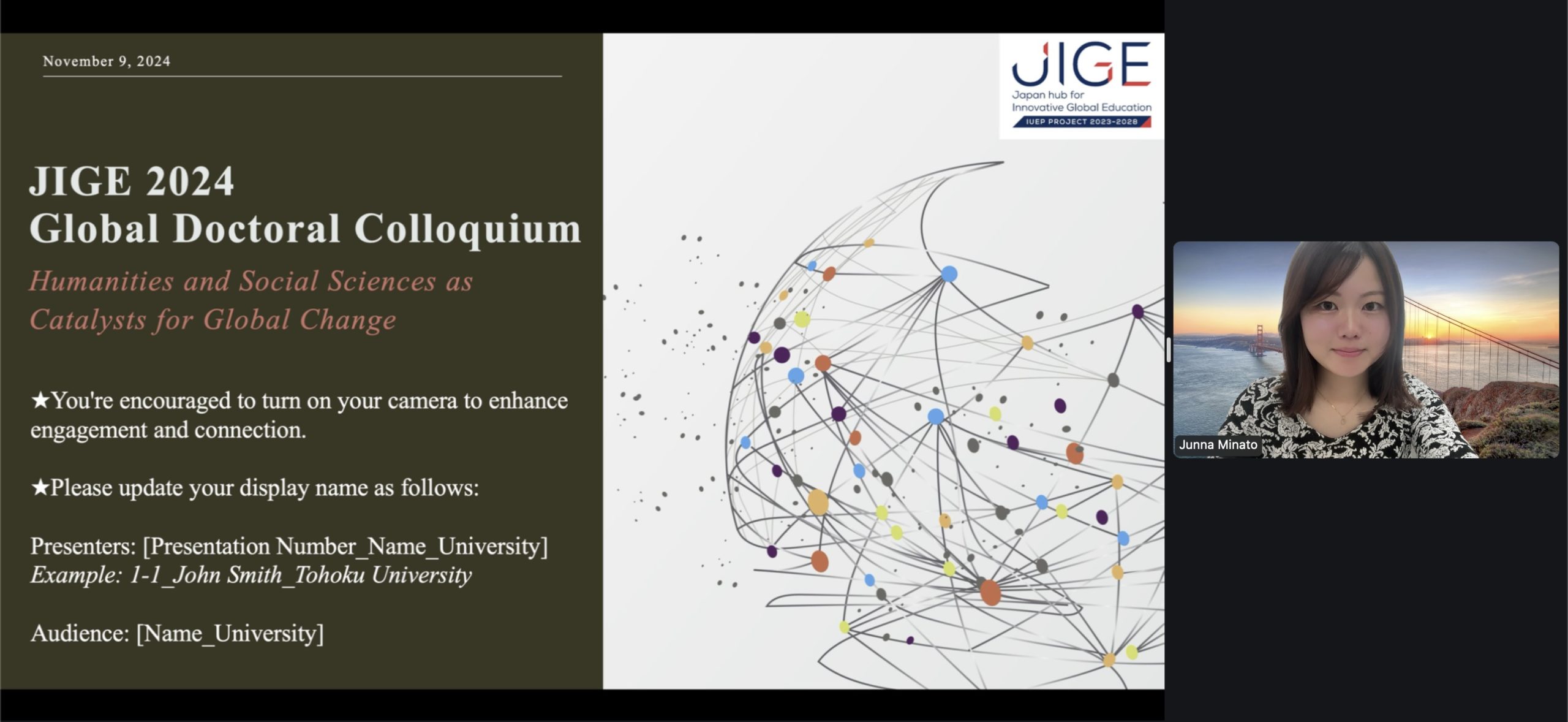The Global Learning Center, Institute for Excellence in Higher Education at Tohoku University (hereafter GLC), hosted its inaugural Doctoral Colloquium from October to November 2024 as part of the Japan Hub for Innovative Global Education (JIGE) project. This education and workforce development initiative, jointly promoted by Tohoku University, Kansai University, and Chiba University, aims to share the latest insights, foster interdisciplinary research, and promote collaborative projects. This year’s colloquium featured two focused sessions: one in the geosciences and the other in the humanities and social sciences.
- JIGE 2024 Doctoral Colloquium Series with Penn State University

On October 30th, Tohoku University hosted the “JIGE 2024 Doctoral Colloquium Series with Penn State University” as a hybrid event. The colloquium series featured a discussion session with the theme of “The Next Millennium for Planet Earth”, followed by a special seminar with researchers from The Pennsylvania State University (hereafter, Penn State), one of the overseas partner universities of the JIGE project.
The colloquium was coordinated by Professor Yoshitaka Kasukabe of the GLC and Professor Yumiko Watanabe, who serves in both the GLC and the Faculty of Science & Graduate School of Science. Opening remarks were delivered by Professor Takeshi Kakegawa of the Faculty of Science & Graduate School of Science. In the morning discussion session, Professor Lee Kump, Dean of the College of Earth and Mineral Sciences, Penn State gave a brief lecture about the next millennium for planet Earth to the participants as an introduction to the colloquium. Online discussion helped facilitate the connection between Penn State on the east coast of the United States and Japan, led by Professor Kevin Furlong at Penn State and Professor Kakegawa. The areas of interest covered not only academic topics about earth science but also ideas on disaster prevention.
The special seminar by Professor Kump followed in the late afternoon, titled “Biogeophysical Tipping Points”. With around 20 attendees, we learned about his work on tipping points in Earth’s history and his collaboration with the late Professor James E. Lovelock, a father of earth system science. The event concluded with closing remarks by Professor Kakegawa, leaving participants with a sense of inspiration and accomplishment.
- JIGE 2024 Global Doctoral Colloquium: Humanities and Social Sciences as Catalysts for Global Change

On November 9th, from 9:00 to 11:00 a.m. JST, Tohoku University hosted the "JIGE* 2024 Global Doctoral Colloquium: Humanities and Social Sciences as Catalysts for Global Change" as an online event. This colloquium served as a valuable platform for doctoral students and early-career researchers in the humanities and social sciences, bringing together participants from overseas partner institutions involved in the JIGE, along with three domestic universities co-leading the project. A total of approximately 40 participants attended the event.
Research Associate Junna Minato of the GLC served as the general coordinator and moderator of the event. Opening remarks were delivered by Professor Kazuko Suematsu, Associate Executive Vice President of Tohoku University and Deputy Director of the GLC. Launching the main session, Professor Emiko Usui from Hitotsubashi University's Institute of Economic Research and Tohoku University’s Center for Diversity, Equity, and Inclusion led a special forum. Drawing from her experience in building a research career in both the U.S. and Japan, Professor Usui presented on "Practical Tips for Entering the Job Market" and engaged in an insightful discussion with participants.
Fifteen doctoral students and early-career researchers from the United States, Malaysia, and Japan took part in the research presentations that followed. Representing eight distinct fields—economics, history, psychology, literature, sociology, cultural anthropology, philosophy, and education—the presenters were divided across five virtual halls for presentations and Q&A sessions on related topics. Master's students also attended as audience members, fostering discussions and exchanges that transcended academic statuses, institutional affiliations, disciplines, and geographic boundaries. Professor Suematsu concluded the colloquium by sharing her vision for building a sustainable research community in the future.
Participants remarked on the significance of networking with students and researchers from diverse universities and fields. They found that such connections not only advance research but also foster personal growth, shaping their attitudes and perspectives as emerging scholars.
Tohoku University remains dedicated to fostering collaborative learning and mutual growth among the next generation of researchers through the continual development and optimization of the JIGE platform.









